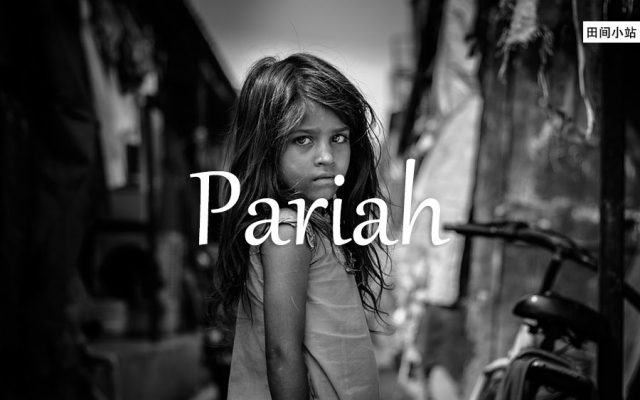本文经授权转载自微信公众号:田间小站

SAT GRE
外刊例句
- At the very moment banks are striving to rebrand themselves as tech firms, internet giants have become the new banks, morphing from talent magnets to pariahs. Even their employees are in revolt.
就在银行努力将自己重塑为科技公司之时,互联网巨头却摇身变成了新的银行,从吸引人才的香饽饽变成了弃儿,甚至连自家员工也在和它们作对。
——《经济学人》 - Governments of the two countries have been toppled by pariah regimes.
两国政府都已被遭国际社会排斥的政权推翻。
——《纽约时报》
基本释义
[noun] an outcast
[名词] 被抛弃者
深入解读
Pariah 一词源自葡萄牙语 paria 或者直接源自泰米尔语 paraiyar (鼓手)。鼓手是印度南部最大的低种姓成员在节日期间的世袭职务,因而 pariah 这个词就被用来表示“贱民”,也就是在印度种姓制度中被排除在印度四大种姓(婆罗门、刹帝利、吠舍和首陀罗)之外的最卑贱阶层。
贱民们受到社会的唾弃、剥削和压迫,一般只允许做非常卑贱的行业,并且代代相传,换句话说一人是贱民,子子孙孙都是贱民。于是到了1819年后, pariah 很自然地就被用来引申指“社会弃儿、被社会遗弃者”,常用来表示不为社会所接受且人人都拒绝与之交往的隶属于某个群体的人,无论这种排斥是否合理,比如:
- 那个脾气暴躁的老妇人拿着一个不锈钢大平底锅向我挥来,于是我就跑出了厨房。她对待我就像对待社会弃儿一样。
The grumpy old woman brandished a large stainless steel pan at me so I ran out of the kitchen. She treated me like a pariah.
而新闻英语中的常见表达 political pariah 便相应表示在权力斗争中失势的人物。至于 pariah state 以及 pariah regime 则是指被国际社会孤立、排斥或制裁的国家和政权,它们甚至会被认为其政策、行为以及存在都不可接受的国家入侵。
名著用例
Everyone knew his affections lay with Carreen, so the news that he was to marry the neighborhood pariah instead sat ill upon them.
大家也都知道他喜欢卡琳,因此当他们听到他要和最近最受大家鄙视的人结婚的消息时,感到无法接受。
出自美国作家玛格丽特·米切尔(Margaret Mitchell)创作的长篇小说《飘》(Gone with the Wind)。
同近义词
- outcast: a person who has been rejected by society or a social group
- derelict: a person without a home, job, or property
- undesirable: a person considered to be objectionable in some way
